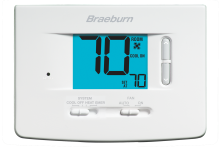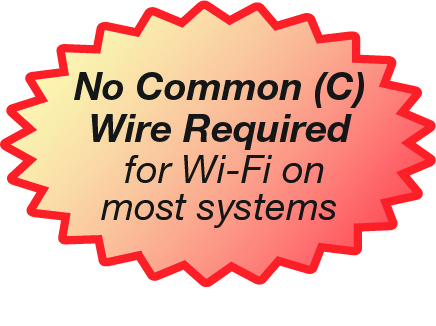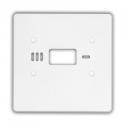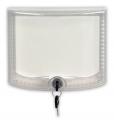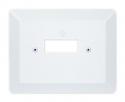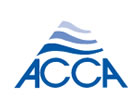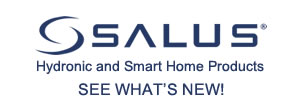
Economy Model 1220 Thermostat
Sorry, this product has no FAQs.
Does my thermostat require batteries?
Braeburn thermostats can be powered by batteries, the 24VAC system transformer or both depending on how it was installed. See the installer manual for more information.
HI is shown in the display where the temperature is normally displayed.
The temperature sensed by the thermostat is higher than the 99° F (37° C) upper limit of the thermostat's display range. The display will return to normal after the sensed temperature lowers within the 40° to 99° F (4° to 37° C) display range. Turn on the cooling system or use other methods to lower the temperature. This condition could occur from the system being turned off during an exceptionally warm period or upon installation when the thermostat has been stored for a long period of time in a warm vehicle or location prior to being installed.
How do I adjust the temperature differential setting?
Press and hold both the UP and DOWN arrow buttons together for a few seconds. The screen will change and your temperature differential setting will appear in the display. Use the UP or DOWN arrow button to adjust this setting to your desired value. Wait a few moments and the screen will return to normal.
How do I get into the USER SETTINGS mode?
To enter the USER SETTINGS mode where you can adjust settings such as your temperature differential, press and hold both arrow buttons for 4 seconds. The display will then switch to the USER SETTINGS mode. Briefly press both arrow buttons together to cycle through each of the different user options and the UP or DOWN arrow buttons to cycle through selections for each particular user option. After a few moments of inactivity the display will return back to normal mode.
LO is shown in the display where the temperature is normally displayed.
The temperature sensed by the thermostat is lower than the 40° F (4° C) lower limit of the thermostat's display range. The display will return to normal after the sensed temperature raises to within the 40° to 99° F (4° to 37° C) display range. Turn on the heating system or use other methods to raise the temperature. This condition could occur from the system being turned off during a cold weather period or upon installation when the thermostat has been stored for a long period of time in a cold vehicle or location prior to being installed.
My heating or cooling system will not turn on at all.
Put the thermostat into the OFF mode. Press the reset button located on the front of the thermostat. Place your system back into the HEAT or COOL mode and try running your heating or cooling system again. If the problem persists then you may have a problem with your heating or cooling system that is causing it to not operate properly. You may need to call your installer or a local service contractor in your area.
My heating system (furnace) functions intermittently or doesn't always reach my set point temperature before turning off.
Put the thermostat in the OFF mode. Press the reset button located on the front of the thermostat. Put the system back into HEAT mode and then try running your heating system (furnace) again. If the problem persists then you may have a problem with your heating system (furnace) that is causing it to run intermittently or turn off prematurely. You may need to call your installer or a local service contractor in your area.
My heating system (heat pump) blows cool air when in HEAT mode and warm air when in COOL mode.
Your thermostat may have been wired incorrectly or you are having a problem with the heating system (heat pump) system itself. You may need to call your installer or a local service contractor in your area.
My system cycles too often or not often enough.
Your thermostat is equipped with an adjustable temperature differential setting which will determine how much your system cycles. The lower the differential setting, the more your system will cycle and the tighter the temperature will remain. If your system cycles too often, raise your differential setting to a higher degree.
The word AUX is showing in the display. What does this mean?
If you have a multi-stage heating and/or cooling system (2 or more stages of heating or cooling) then this means that the 2nd stage (auxiliary stage) of heating or cooling is running based on the calculated need imbedded in the logic of your Braeburn thermostat. If you do not have a multi-stage heating or cooling system then AUX being displayed means that a multi-stage thermostat was installed on your single stage system and you will occasionally see AUX displayed on the screen, however it does not affect the function of your thermostat or system.
The word EMER is showing in the display. What does this mean?
If the word EMER appears in the display, it indicates that your thermostat is in Emergency Heat mode. Emergency Heat is a backup heating system commonly used with heat pump systems. When in Emergency Heat mode your heat pump compressor will not be active. Emergency Heat mode is typically used when your heat pump system is not functioning or when it is too cold outside for your heat pump system to adequately maintain a comfortable temperature.
What is the temperature differential setting?
Your thermostat is equipped with an adjustable temperature differential setting which will determine how much your system cycles. The lower the differential setting, the more your system will cycle and the tighter the temperature will remain. If your system cycles too often, raise your differential setting to a higher degree.
What type of battery should I use for my thermostat?
If your thermostat requires batteries, use only type "AA" alkaline batteries. Make sure to install the positive (+) and negative (-) ends of the batteries correctly as shown inside the battery compartment.
When I turn on my gas furnace cool air blows out of the vents for the first couple of minutes.
Your thermostat may be configured for an electric furnace. When configured for an electric furnace the fan comes on immediately when there is a call for heat. Gas furnaces need a couple minutes of warm up time before the fan runs. Please see the "installation" section of your owner's manual for information on how to properly set your gas/electric fan option. All manuals are available on this website.
When I turn on my heating system (furnace) it takes a couple minutes for any heat to come out of the vents.
Most gas furnaces have a short warm up period before the fan will come on and circulate the warm air throughout your ductwork. This is to prevent cool air from blowing at initial startup and is not controlled by the thermostat.
When should I change my batteries?
If your thermostat requires batteries, you need to change them when the battery icon appears in the display. This indicates that the batteries are becoming low and should be changed as soon as possible. Always change batteries when you will be away for a long period of time.
Why does the display say NO when I slide the system switch to EMER (Emergency Heat) mode?
Your thermostat can be configured for multiple system types. The EMER position is reserved for a multi-stage heat pump system. If you have a gas/electric furnace the EMER mode is not available and will display NO if you try and select it. If you have a multi-stage heat pump system and is still says NO then your thermostat is configured for the wrong system type. Please see the user manual for information on changing the system type. All users manuals are available on this web site.
Product specifications may change without notice.
